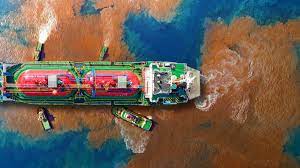Countries will have two years to put the updated directive, which covers crimes ‘comparable to ecocide’, into national law.
The European Union has become the first international body to criminalise the most serious cases of environmental damage that are “comparable to ecocide”.
Ecosystem destruction, including habitat loss and illegal logging, will be punished with tougher penalties and prison sentences under the EU’s updated environmental crime directive.
In a vote in the European Parliament on Tuesday, EU lawmakers overwhelmingly backed the move with 499 votes in favour, 100 against and 23 abstentions.
Member states now have two years to enshrine it in national law.
Here’s what you need to know about the updated law, which experts are calling revolutionary.
Environmental crime: A new page in the history of Europe
According to Marie Toussaint, a French lawyer and MEP for the Greens/European Free Alliance group, the EU is “adopting one of the most ambitious legislation in the world.”
“The new directive opens a new page in the history of Europe, protecting against those who harm ecosystems and, through them, human health. It means putting an end to environmental impunity in Europe, which is crucial and urgent,” she says.
According to Toussaint, current EU and national legislations are not dissuading offenders from committing environmental crimes, because offences are too limited and sanctions very low.
“Environmental crimes are growing two to three times faster than the global economy and have in a few years become the fourth largest criminal sector in the world,” she says.
Environmental crimes still occur in Europe. In its report on the fight against environmental crime in Europe, the European Environmental Bureau cites numerous examples of environmental crimes that were still going unpunished because they were not included in the old directive.
These include illegal fishing of bluefin tuna, agro-industrial pollution in protected areas, as well as illegal hunting practices and carbon market fraud.
Environmental crimes comparable to ‘ecocide’

Proponents of making ecocide the fifth international crime at the International Criminal Court argue that the updated directive effectively criminalises ecocide. Even though the directive does not include the word directly, in its preamble, it refers to “cases comparable to ecocide.”
Ecocide is defined as “unlawful or wanton acts committed with knowledge that there is a substantial likelihood of severe and either widespread or long-term damage to the environment being caused by those acts.”
It was formulated in 2021 by 12 lawyers from around the world and presented by Stop Ecocide International.
Last year, the Parliament proposed including ecocide in EU law.
10 year jail sentences for committing environmental crimes
Water abstraction, ship recycling and pollution, the introduction and spread of invasive alien species, and ozone destruction are all identified as environmental activities in the new directive.
It does not mention fishing, export of toxic waste to developing countries or carbon market fraud, however.
For individuals – such as CEOs and board members – consequences for committing environmental crimes can be prison sentences of up to eight years, rising to 10 if they cause the death of any person.
Lawyer Antonius Manders, Dutch MEP from the Group of the European People’s Party (Christian Democrats), has described the changes as very hopeful.
“CEOs can risk a fine, but they do not want to be personally involved. They never want to go to jail,” he says.
Individuals can be held liable if they were aware of the consequences of their decisions, and if they had the power to stop them, Manders explains.
“For example, a permit defence is no longer possible, as people have a duty of care. If new information shows that behaviour is causing irreversible damage to health and nature – you will have to stop.”
Michael Faure, a professor of comparative and international environmental law at Maastricht University agrees.
“When implemented by the member states, operators must be aware that merely complying with a permit no longer frees them from criminal liability. And that is no less than a revolution,” he says.
Under the previous EU environmental crime directive and most member state laws, environmental crime can only be punished when there is unlawfulness, but as long as an enterprise followed the conditions of a permit, their actions would not be considered unlawful.
“As a result, there could be gross environmental pollution cases, even with concrete damage to human health as a consequence. But as long as an operator complied with the conditions of a permit, there was no unlawfulness,” Faure says.
An example, Manders explains, is that the chemical industry in the Netherlands in 1982 was given a permit to pollute water with PFAS, before these chemicals were identified as harmful to human health.
“But today, we know that the chemicals cause cancer and even death. So in a court case like the one about the chemical company Chemours, even though the company has a permit, when the new directive comes into force, it has to stop, since it has been proved that PFAS harms people,” Manders adds.
Does the updated environmental directive go far enough?
Member states will have two years to implement the revised directive in national law.
Among other things, they will have the flexibility to choose whether to introduce fines for companies based on a proportion of their turnover – up to five per cent depending on the crime, or fixed fines of up to €40 million.
“We would have liked to go much further,” Toussaint says.
It will also be up to member states if offences committed outside EU borders on behalf of EU companies will fall under the new directive, as this has yet to be agreed on by the EU.
While it is indeed “revolutionary”, Manders advocates for also having a public prosecutor at EU level.
“That is the future. However, it will depend on the evaluation of the European Public Prosecutor’s Office mandate – and if in the future the EU could handle such cases,” he says.
Toussaint agrees, and says it is crucial to keep an eye on the ongoing negotiations at the Council of Europe, where the Convention on the Protection of the Environment through Criminal Law – equivalent to the EU directive but at Council of Europe level – is currently being revised.
“This convention, originally adopted in 1998, has never been ratified and has therefore never officially come into force. The current revision of the European directive could thus have a major influence on the negotiations underway and an impact outside EU territory,” she says.



